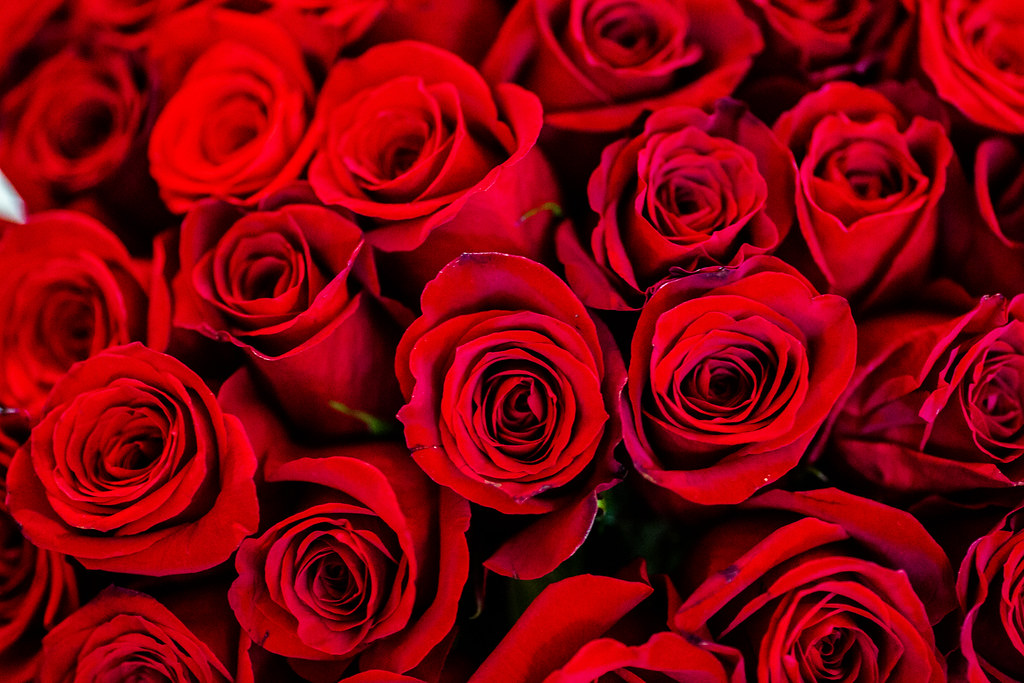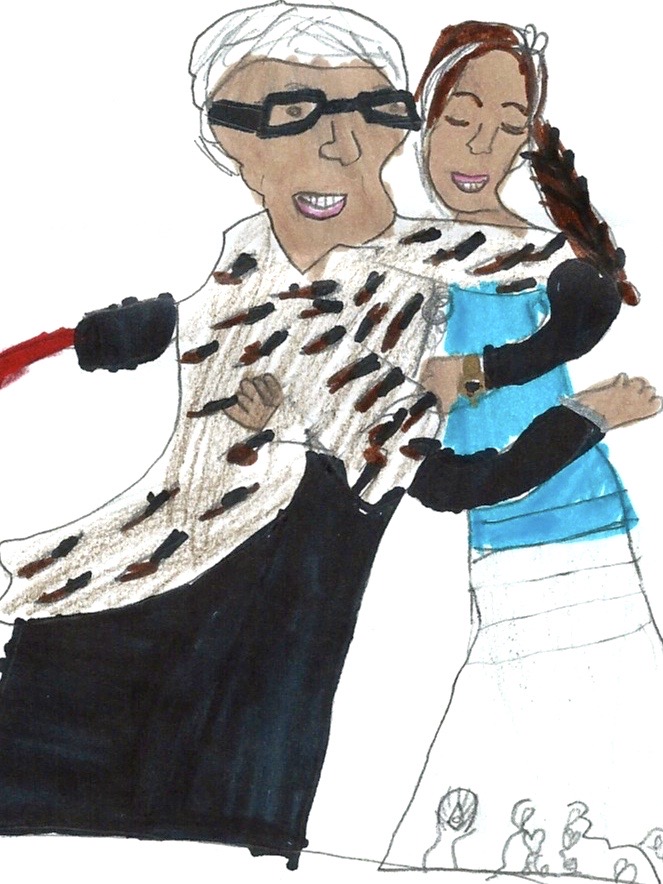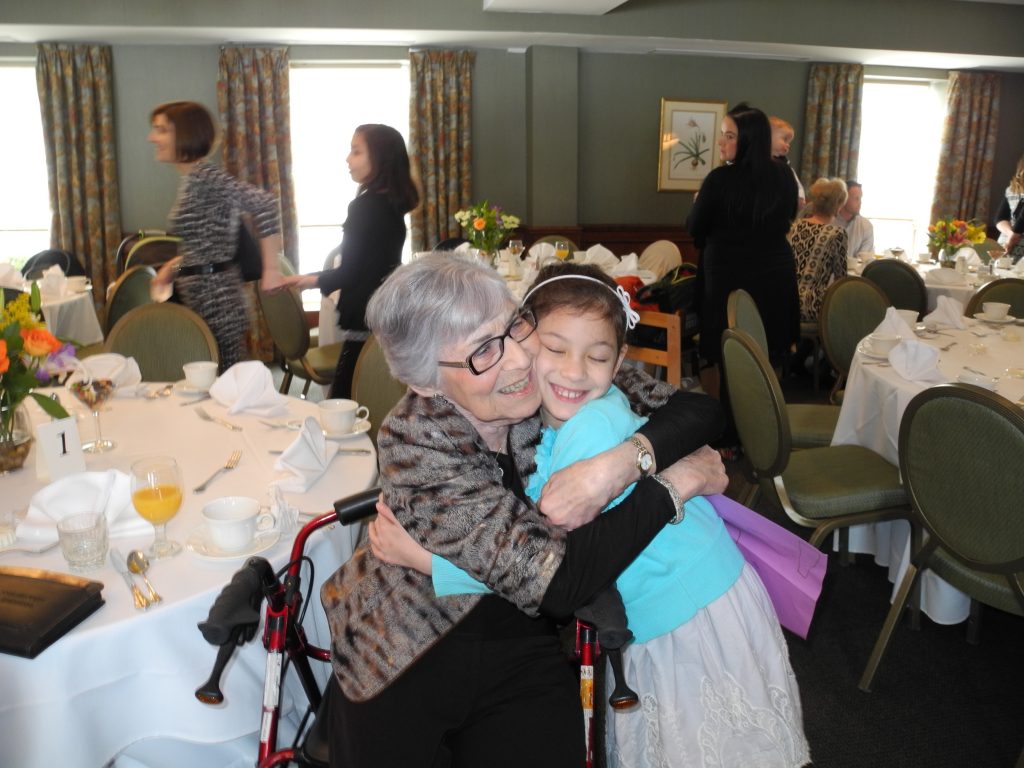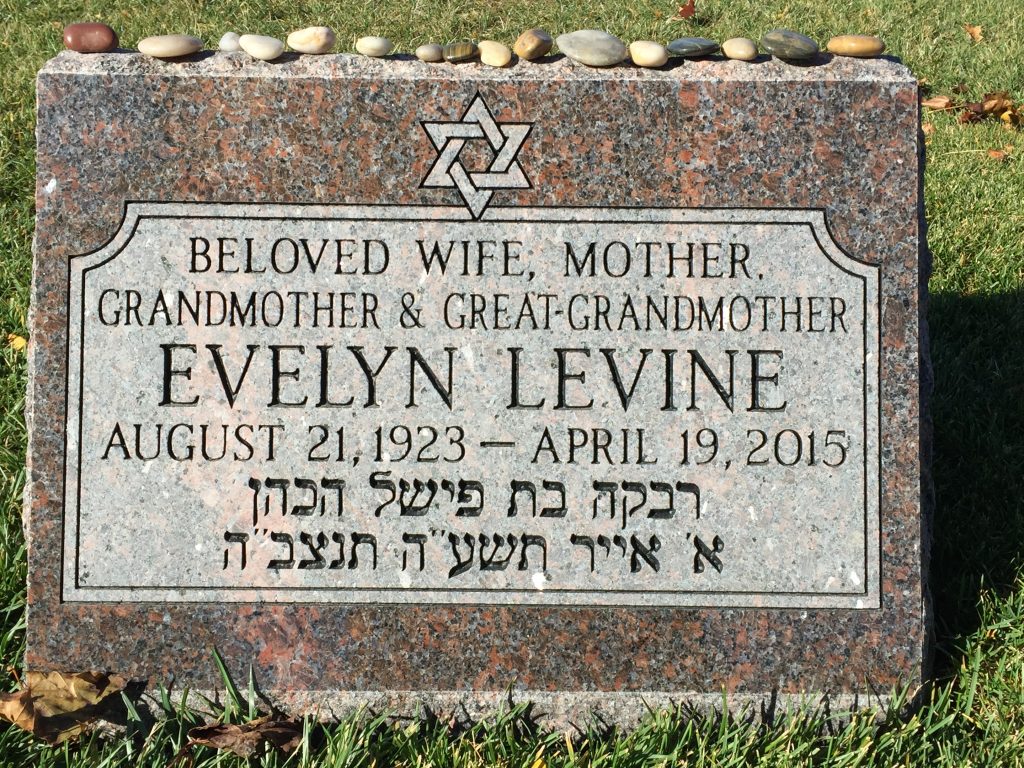
Funerals were forbidden when I was growing up. They were mysterious events my parents attended with other adults. My first introduction to this final rite of passage was my grandfather Philip Krut’s funeral on May 2, 1972. I was 26 years old and the mother of a one-year-old. Did I attend alone? Were my husband and baby son with me? I don’t remember. Sadly, I only have one memory from that funeral. My mother insisted I view her father’s body “out of respect,” and that is the first image I have of him when I think of my beloved grandfather to this day.
Seven months later, my father-in-law, Albert Levy, died at age 57 from a heart attack. I remember the shock and anguish. I remember having to manage the Shiva clean up while looking after a toddler. What I don’t remember, what my husband and his siblings don’t remember, is the actual funeral. I’m sure we hired a random rabbi and recited the standard prayers. I’m sure he gave some sort of eulogy based on meeting briefly with a shell-shocked family. I’m sure he said Albert loved his family above all. Whatever he said, none of us found it comforting.
After those experiences, I was adult enough to go to funerals … too many funerals. And what they all had in common was a lack of remembering and celebrating who the person really was. Most often, only the clergy spoke about the deceased. While attending the funeral for a close friend’s mother, someone I actually knew pretty well, the rabbi launched into the traditional remarks for the death of a mother and grandmother from Proverbs 31:
Who can find a virtuous woman? For her price is far above rubies.
The heart of her husband doth safely trust in her, so that he shall have no need of spoil.
She will do him good and not evil all the days of her life…
Blah, blah, blah. The good wife and mother. I’m sure she was, but she was also a unique person. That never came through. No one from the family was encouraged to deliver a eulogy. Rather than feeling like I was there to celebrate her life, I felt sad and bored.
When my mother-in-law, Lillian Levy, died on March 18, 2010, her family agreed that her funeral would be meaningful and celebrate who she was. We selected an officiant who encouraged family members to deliver their own eulogies. Her children spoke as well as one of her grandchildren. My contribution was to create a photo collage of her life and to add small framed pictures of her at various stages of her long life, which family members took after the service. We knew she would have liked flowers, even though they are not part of Jewish tradition, so we placed a spray of roses on her casket. When we buried her, every child and grandchild put a rose on her coffin before shoveling three scoops of dirt into the grave. We cried and hugged one another. She would have loved her funeral.
Two years later, my father, Sidney Levine, died on July 5, 2012. Planning his funeral was more challenging as we were dealing with conservative Jewish traditions in Detroit, but my mother’s wishes prevailed. She wanted it to be personal like my mother-in-law’s service. She wanted his children to deliver eulogies. She wanted photos of him. She even wanted the spray of roses. No one was going to impose religious customs on a grieving 89-year-old widow. So, we celebrated my father’s life with a funeral service that combined tradition with personal touches, and my mother was pleased.
When Mom died on April 19, 2015, we knew exactly what she wanted. As her death was unexpected (as unexpected as it could be for someone who was 91), my brothers and I rushed to write eulogies for her. The photos were no problem because her home was filled with framed pictures of her parents, her life with our father, us as children, wedding pictures of her grandchildren, and pictures of the nine great-grandchildren she had at the time. We ordered the roses too. But there was an additional surprise that would have pleased her so much. My nine-year-old granddaughter also wanted to deliver a eulogy. Why not? She had just seen her great grandmother at our niece’s wedding reception the month before. She drew a picture to go with this eulogy:
My Bubbe is so special. She helped me inherit the gift of being good with elderly people. When I was very little, she used to crawl on the floor to play with me and my sisters. She didn’t miss a thing. Every time I made something, she put it on her refrigerator. I felt very close to her. When I have children in about 21 years, I will name one with a name that starts with an E to remember my Bubbe. If she was in a Harry Potter house, she’d be a Hufflepuff, loyal and kind. I miss her so much. One time I went over to her house, and there was a big bowl of candy as always. I took a caramel It calmed me a few days later when I needed it. When she broke her hip, and nobody thought she’d walk again, she did. I loved and love my Bubbe. Her spirit is in us, and we remember her in the way she wanted to be remembered.
Our Rabbi once said that she gives a good funeral, and I know this is true. When a friend and member of our Chavurah (Jewish fellowship group) died last January, she officiated at a wonderful celebration of his life. His children, grandchildren, and a couple of life-long friends delivered eulogies that were so on the mark that it felt like Henry was in the sanctuary with us. It may have been long, but it was so meaningful to everyone there. Most of all, we knew Henry would have loved it.
I invite you to read my book Terribly Strange and Wonderfully Real and join my Facebook community.
Boomer. Educator. Advocate. Eclectic topics: grandkids, special needs, values, aging, loss, & whatever. Author: Terribly Strange and Wonderfully Real.





Indeed Laurie, funerals are most meaningful when friends and family -rather than just the clergy – speak about the deceased.
Our good friend David died a few years ago. David was an especially dear, charming and funny guy and his widow and two daughters had us laughing out loud at their sweet and very, very funny memories of life with him.
The rabbi waited for the laughter to die down and said, “I’ve never had so much fun at a funeral!”
Sorry for your loss of a good friend, but I agree it’s better to try to celebrate someone’s life.
I am glad there is progress with making funerals much more into celebrations of an individual’s life, and it’s good that, at least recently, this happened for your relatives, Laurie. Rituals must have meaning to be healing. Maybe that’s why I don’t remember that much about the funerals for my grandparents and my aunt. There wasn’t anything individual about them. I hope there is more meaning and less pain for you going forward.
Amen to that, Marian. I feel blessed that at least for three of our parents, we were able to honor their lives in a way that would have pleased them.
Laurie, I love the idea of a “good funeral” — I’ve gone to some — and you speak of it masterfully. Sorry you’ve also had a few not good ones along the way, And your granddaughter’s eulogy and her drawing are heartbreakingly beautiful.
I had to include her eulogy, John, because it was such a contrast to what I experienced at that age. She’s a remarkable child in her capacity for empathy. When she was three, she crawled into bed with my mother at her nursing home and gave her a teddy bear.
Thank you for confirming what I suspected, that funerals were forbidden (for children) when we were growing up. And thank you also for your thorough and beautifully written description of funerals good and bad that you have attended. I agree that giving family and friends the opportunity to speak is the most important part of a funeral. And I adore the drawing and eulogy by nine-year-old Maya! So glad you included them in your story.
Thanks, Suzy. I think in a misguided effort to protect children from death, our parents made it something fearful when we finally had to confront it as young adults.
Laurie, your memories bring back so many memories of my own and you are spot on about everything. We WERE shielded from death as youngsters. I remember when my grandmother’s sister, my beloved Aunt Bea, died, but I was deemed too young to attend the funeral, though I was a serious and sensitive kid. I wanted to remember her in a meaningful way and resented being left behind when the grown-ups left for the service. I was away at camp when my grandfather died, so I had to mourn for him as best I could (I wrote about it in “Saying Shema on the Rosary”). So my grandmother’s funeral, when I was about 15, was my first funeral. She was about 90 when she passed. It was an open coffin and I was shocked to see a tiny head sticking out from a shroud! That is an indelible image for me.
I’ve attended many funerals of relatives of friends since then, the most traumatic was my own father’s, who died suddenly of a heart attack in 1990. I had an 8 month old nursing baby, we all had to go Detroit (yes, Kaufman’s Funeral Chapel). We were shell-shocked. Our congregation rabbi, though retired, gave the eulogy. He did know my father and it was comforting to hear his familiar voice, even if I had moved away long ago.
I think the idea of family and friends delivering eulogies is fairly new. You describe a progression (and the wonderful, heart-felt feelings that come with the warmth of recognizing the person being laid to rest); perhaps within the last 20, 25 years or so. I agree, it is a much better way to honor and pay tribute to the deceased. And I love the drawing and eulogy from your granddaughter. What a lovely tribute!
Thanks, Betsy. Yes, I suspect we had similar upbringings surrounding death. Few explanations and no experience. I know how you felt as a young mother with a baby at your beloved father’s funeral. I had a similar experience when my father-in-law died. Shell shocked describes it perfectly. The granddaughter who delivered the eulogy was right when she described herself as someone who loved old people. While it was hard for her to experience the deaths of three great grandparents, she truly learned so much about love and remembrance.
This was heartwarming, Laurie. I love the way these services/ceremonies/celebrations evolved in your family as you began to honor relatives in a more meaningful way. I love the Harry Potter reference…priceless! One more thing: when my grandfather died, I was 26 and pregnant. I went to the funeral home, but was forbidden to go to the cemetery! Some Jewish custom I was not aware of. Oh, and this: when my father-in-law, a die-hard Cal football fan passed away, we arranged for the spirit band to burst through the doors of the church at the end of the funeral. They played the team’s traditional fight songs and there wasn’t a dry eye in the house! People told us we threw a great funeral!
Risa, I love the spirit band at your father-in-law’s funeral. I’m sure he would have loved that! I never knew that pregnant women weren’t supposed to go to the cemetery for Jewish funerals. I suspect it is more of a superstition (don’t let the evil eye hurt your baby?) rather than a religious thing. My granddaughter who gave the eulogy is now 14 and past her Harry Potter obsession, but still a remarkably thoughtful girl.
Laurie, I was taken by your repeated forgetfulness regarding the rituals of departure. Forgetfulness is, in my estimation, the exact opposite of insignificance; forgetfulness often suggests that the pain and the burden of pain or loss floods the heart and short circuits the mind. I felt that in your recounting, along with the pain of ushering young ones through the valley of the dead. The picture of your mother’s grave prompted me to look into the significance of stones on the grave site, something I have often seen, but never understood. Although one aspect of the ritual seems to include superstition about the helping to weigh down the soul, another aspect seems equally weighty: flowers, like life, fade. Stones don’t die. Thanks.
Thanks, Charles. I guess I should have explained the placing of stones on a grave, which is also very comforting and meaningful. In Jewish tradition, the gravestone is put up sometime after burial (it used to to a year, but now it is generally done within a year when the weather permits) in a ceremony called an unveiling. As we did with the funerals, we created our own unveiling ceremonies, which brought closure. I always thought of the stones as a concrete mark of respect and a way to indicate you were there. The custom is to add a stone to the grave of anyone you knew. When we buried my mother-in-law and parents, we added stones to the graves of other family members as well. This was actually a good thing for my grandchildren who were able to connect with relatives they had never met. It was an opportunity to tell their stories.
Thanks, Laurie, for your personal and complete explanation. I have participated several times in visits to the graves of friends and families and participated in stone placing. Although I didn’t know the complete story behind the tradition, I, too, felt it comforting thru some suggestion of permanence and ongoing-ness.